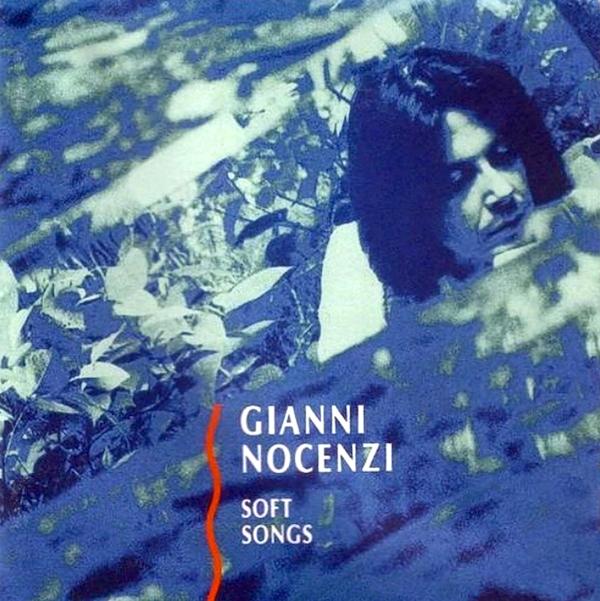
For such a short solo career Gianni Nocenzi’s work is quite mercurial. In the span of two albums, recorded five years apart, this giant of Italian prog released music that sounded like little else he’d ever do. Most importantly, here, in 1993’s Soft Songs he tries to cross a bridge few would actually venture to cross then.
Partly recorded in Japan and New York City, but mostly in Milan. Partly aided by Japanese musicians Ryuichi Sakamoto (who’s that?) and mostly by Japanese ambient jazz trumpeter Norihito Sumitomo, featuring guest vocalists like Sarah Jane Morris, Andrea Parodi and Sonny Southon it never decides whether it belongs in the realm of neoprog, New Age, minimalism, or whatever this new thing was. To its credit that’s exactly what Gianni wanted.

Gianni’s story begins with Banco Del Mutuo Soccorso. Together with brother Vittorio Nocenzi they created a distinctly Italian flavor of prog with heavy roots in the dexterous, complex juggling of jazz, classical, and rock they pioneered. These champions of early synthesizers found ways to keep some modicum of respect as other prog giants floundered to live on throughout the ‘70s. However, by the early ‘80s Gianni had enough.
Beginning with 1983’s Banco, BMS hit a rough patch by aiming to remain culturally relevant by traveling down the music industry’s middle of the road. As for Gianni, the more stubborn of the two brothers, he decided to move on.
Discovering new roots in a different kind of experimental music, 1988’s Empusa saw Gianni translate ideas from a contemporary slate of Italian minimalist thinkers into his own musical vocabulary that found a taste for world music. Using all sorts of samplers, beat machines, and digital synths, he created music that was decidedly more ambient and cosmically influenced. For those craving his highly melodic piano playing from earlier days, Empusa was definitely not the record to place your chips on. For those that wanted to hear something more surprising this was it.
Those “fourth world” ideas used to describe Empusa, for lack of a better categorization would yield a more austere direction five years later.
After facing a time of personal crisis and a time of true separation from his primary instrument, the piano, Gianni had to be convinced to make music altogether. Forsaking his attempt to hide from that dreaded word “Pop”, Gianni took it upon himself to try to marry both worlds: the experimental and sentimental.
Soft Songs sounds like a searching record. As hinted at in the album cover, Gianni found himself in a deeper state of reflection. Returning to writing music with vocals and sprawling across the world looking for a certain sound, found him returning to his melodic roots. Finding simpatico partners like trumpeter Norihito Sumitomo felt like a boon to him. Here was a different musician who recognized the power and experimentalism in melodicism.
With the full backing of Richard Branson’s Virgin label, Gianni gathered various talents to build on the watery fourth world music he created in the shadows of the music industry. It now became an experiment of folding his compositions within a band environment again. The results (thankfully) proved to be rewarding for him.
The opening song “Al Principio Dell’Arcobaleno – Part One” presents the fascinating turn of events. What begins as a solo song of clarinet and environmental noise gets fundamentally altered by the introduction of Norihito’s sinewy EWI wind synthesizer and trumpet. Now we get a full-throated transformation into a magnum opus far from the quieter, mysterious sound of the prior record. Prog fans might still get a sense of his roots but all these esoteric electronic twists keep the focus on this new direction.
Though the course of its next four “Soft Songs” — “47th Dawning” (Soft Song #3) sung by smoldering UK soul singer Sarah Jane Morris, “All Of You Is Shining” (Soft Song #5) sung by downtempo diva Sonny Southon and “Mintoi” sung by little-known Italian balladeer Andrea Parodi — we get a moment of solitude a “Song Of Myself”, an intricate neoclassical ditty, acting as its own bridge from the bombastic ambient pop of “47th Dawning” into (arguably) the album’s masterpiece “Mintoi” (Soft Song #1).
Much like the master Franco Battiato’s own reimagining of the Italian operetta style in a brave new world, so does Mintoi take a full-throated absorption of those “folk: roots through courses influenced from the orient and far east, from a simple base in the sonority of that oldest (of still current) instruments — the piano — twisted through gorgeous melodic passages, overdubbed with all sorts of esoteric electronic manipulation, contorting you the listener and itself into a shape-shifting song oozing with gorgeous melancholia. Six minutes seem to go too fast here.
The album ends on an inspiring pairing, one has to do a double take to actually recognize that, yes, this was pulled off. Recorded in pieces, across all locations, yet somehow close to the source of its inspiration, on “Al Principio Dell’Arcobaleno – Part Two” Ryuichi Sakamoto joins Gianni and Norihito to fuse the leftfield melodicism of all involved into one epic track of Eastern and Western impressionistic ambient minimalism.
Whether jumping on sampled string instruments or shifting to a phalanx of piano and keyboards, here were two masters at the top of their game (perhaps aged out of whatever was au courant then) creating something truly timeless, a jazz that has aged perfectly into our age, trading sentimentalism for wisdom gained from experience. All Norihito can do is keep them firmly tied to this, our earth space.
